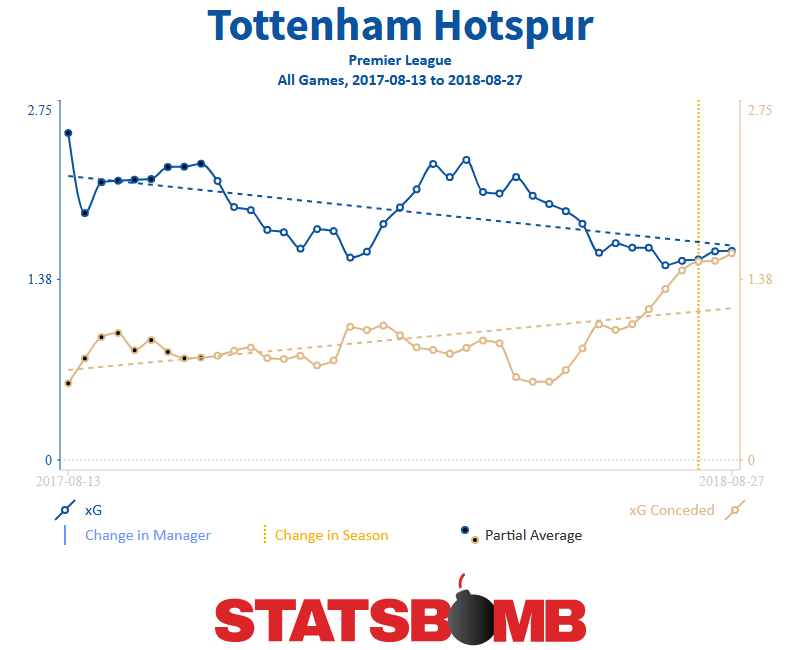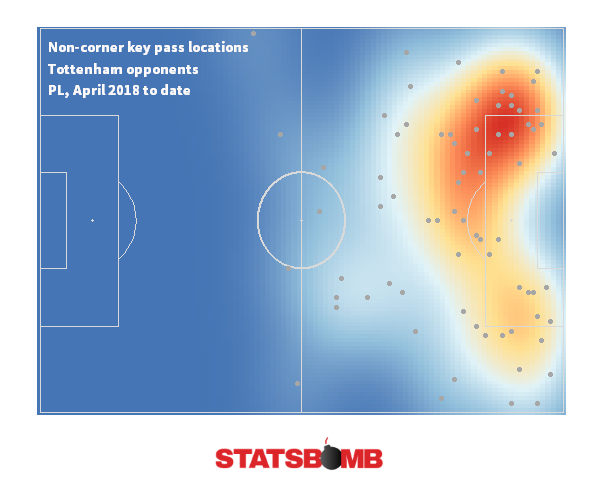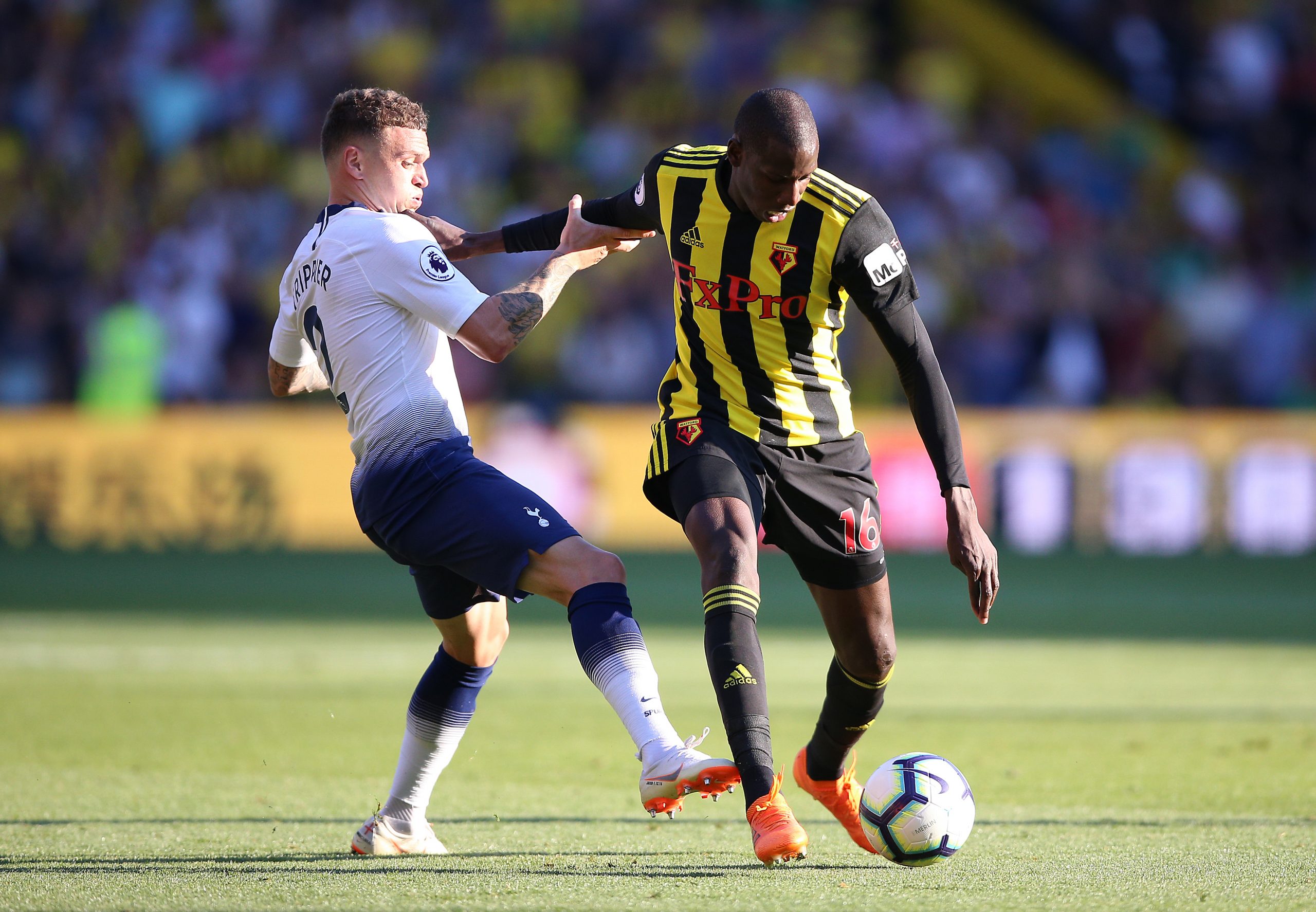After a 3-0 victory at Old Trafford last Monday night, it would be easy to presume that Mauricio Pochettino would be overjoyed. In the moment, he made all the right noises but by the time Friday had come round and he was doing the pre-match press conference ahead of this weekend's Watford game, his mood had soured: "I was so disappointed. I think we need to improve our performance. The first half I wasn't happy and I translated that to the players. We need to fight against the perception. When you compare the perception and the reality, we need to talk about the reality, and the reality was in the first half we can concede one, two or three goals.” This attitude towards the performance is encouraging, for it shows a clear understanding of process, and while the result was ideal, the way in which it transpired was far less so. Across Pochettino’s entire Tottenham tenure, the team has not allowed more than the 23 shots that Man Utd created in this game. In the first instance, that’s a big red flag. Nobody expects a trip to Old Trafford to be a straightforward task, but nor does any plan involve allowing so many shots. Immediately it reflects a lack of control. The obvious kicker here is whether they were good shots. United’s xG for the game came out at around 1.7, so at least in part the answer is “not really”. However, Pochettino was correct in his assessment that United could well have scored, with Lukaku’s jarring miss the most obvious example, and he is correct to be annoyed that his team failed to keep United’s attack quiet. The vagaries of football mean that expectation and reality can often diverge in single matches, or over small samples of games and that’s why analysis is most useful over longer periods. The trend to reset the world and all totals as a season ticks from one to another is understandable but means much early season analysis does not lend itself to hefty evaluation. There really is no need to look at just this season, when we have all of last season that we can happily connect to this and the resulting trends to examine too. And that’s why we end up here: Tottenham’s defensive metrics have been trending negatively since around February:  Basically, across the last ten to fifteen fixtures, Tottenham’s expected goal production has been roughly equal in attack and defence. The attack side has been largely good, the defence has not. Let’s define the defensive numbers from the start of 2017-18 onwards, so 42 games. Since 7th April, via expected goals against, we have seen eight of Tottenham’s worst 10 performances:
Basically, across the last ten to fifteen fixtures, Tottenham’s expected goal production has been roughly equal in attack and defence. The attack side has been largely good, the defence has not. Let’s define the defensive numbers from the start of 2017-18 onwards, so 42 games. Since 7th April, via expected goals against, we have seen eight of Tottenham’s worst 10 performances:
| Date | Home | Away | Shots against | xG Against |
|---|---|---|---|---|
| 16 Dec 2017 | Man City | Tottenham | 21 | 3.76 |
| 14 Apr 2018 | Tottenham | Man City | 17 | 2.86 |
| 5 May 2018 | West Bromwich Albion | Tottenham | 14 | 2.28 |
| 9 May 2018 | Tottenham | Newcastle | 18 | 2.00 |
| 7 Apr 2018 | Stoke City | Tottenham | 11 | 1.93 |
| 13 May 2018 | Tottenham | Leicester City | 18 | 1.84 |
| 27 Aug 2018 | Man Utd | Tottenham | 23 | 1.70 |
| 30 Apr 2018 | Tottenham | Watford | 13 | 1.45 |
| 18 Aug 2018 | Tottenham | Fulham | 10 | 1.33 |
| 23 Sep 2017 | West Ham | Tottenham | 12 | 1.30 |
That's eight of their most defensively vulnerable performances across a whole year within their last 11 games--and it's not a case of a bad schedule, there are plenty of games in that list against teams considered weaker within the league. The before and after of expected goal values per shot aren't pretty either with an average of 0.092 before April and 0.105 since. I warned of this general trend in my season preview while remaining positive that Tottenham were well placed to have a successful season. As such it has been disappointing to see the opening games of this season fail to adequately address the problem. It was feasible to estimate that this could have been a late season blip caused by tiredness and/or a drop in focus once trophies had gone elsewhere. After all, it's hard to get a true handle on late season games and in particular the 5-4 season finale win over Leicester feels like it should exist outside any serious analysis, with such a kooky result unlikely to recur.
Defensive changes
Having now come through four games of 2018-19 it feels that Pochettino has an understanding of the flaws in his current team and had been trying to “fix” his team on the fly, with the Watford game, despite defeat, showing the most positive indicators. He will be well aware that performance levels have dropped in recent months and already formation-wise we have seen changes in 2018-19. The three centre back flirtations in early 2017-18 had seemed consigned to history once Toby Alderweireld was first injured then landed in contract purgatory. Now firmly back in the mix, he appears to be first choice alongside Jan Vertonghen but with the option of going with the three once more, and Davinson Sanchez sitting in between and the withdrawal of a midfielder. Against Newcastle, Tottenham started with a back four--and weren't great. Against Fulham they played the back three, were fine until the second half, until Fulham got a real handle on the game in a burst during which they scored, before Sanchez was withdrawn for Mousa Dembélé and control returned. Against Man Utd, the back four returned and United racked up the shots, while against Watford, we saw the back three again, in which despite scoring twice Watford created very few chances. This chopping and changing appears to be an attempt to manage an issue and having looked at both data and watched every shot Tottenham have allowed since February, the source of this defensive woe looks clear: their right side has been vulnerable. Here is a map of the shot assist/key pass locations that Tottenham have allowed since April: 
Team issues
It's straightforward to identify a player in a position and earmark them as culpable, and superficially it appears to paint a poor picture for Kieran Trippier. To start with he has started the vast majority of the games in this period with eight, while Serge Aurier has started three games and Kyle Walker-Peters once. Prior to this period Trippier and Aurier shared the role more equally, as is typical of Pochettino full-backs. It's important to back up evidence from data with a wider view and if you actually watch the footage of shots against Tottenham, you see a large volume of attempts are generated from play down his flank, often with him upfield. He is forced to retrieve positions frequently, and even when more usefully positioned, he appears slightly slow to react to attackers' movements, and allows a high volume of passes infield. Ironically, given his reputation for extreme rashness, in general, Aurier appears far more positionally comfortable and feels more joined to his defensive unit. Of course, this analysis can falter if we do not consider other factors: Trippier's role in the team has developed into far more of an attacking contributor and is entirely shaped by instructions: going forward he is extremely good. And we aren't necessarily considering other players charged with patrolling this area--Sanchez or Eric Dier may find themselves required to cover Trippier or Aurier from centre back and defensive midfield positions. It's a fluid issue. There is also a data point here that reflects the defence more generally. Since the start of April, only Arsenal have allowed more shots (74 to Tottenham's 67) within ten seconds of the opposition gaining possession (a measure that also captures most set-pieces). Part of this is a function of how high up the pitch so much of their play is, but also that they have struggled to resist chances via the subsequent opposition attacks. All this is why Pochettino's early season tinkering appears informative. Tottenham's defence isn't performing as well as it has in the past. Getting the three centre back system working does take some defensive responsibility away from Trippier and shunts Alderweireld over towards that location a little more. It looked flawed against Fulham, because eventually a balance in midfield was lacking. Returning to a back four against United and struggling to limit them, Trippier was the first man subbed off, with Aurier replacing him. The pre-match team on Sky were surprised that Pochettino made changes against Watford and Dier's omission was unexpected, but Tottenham--again with three centre backs and Trippier higher up-- put up their best overall defensive performance in literally months, then got sucker punched by two set pieces. That can happen and while the Watford performance was disappointing more from a creative vantage point, it's worth recalling Tottenham created little in either fixture against them last season too. Trippier contributes so much going forward now that is makes sense that Pochettino wants to get him into the team while also minimising any vulnerability that is caused by him being forced to reside deeper and defend. The additional centre back does achieve this.
What next?
It's hard to predict which way this will fall out for Tottenham. The fixture list isn't a clear beacon of hope. They play only eight of their fixtures at "home" during the first half of the season due to the ongoing development of White Hart Lane. By the time they get to seven games will have played just two at Wembley, including a difficult forthcoming fixture against Liverpool. Tough games and away games are not the ideal setting to apply fixes, so the scheduling may well hinder short term progress, while a nearby Champions League visit from Barcelona will surely test any remaining vulnerabilities to the maximum. It feels as though Pochettino is determined to use the stylistic motif and strength of his personnel in persisting towards three centre backs. There are greater issues with choosing who of Alderweireld or Sanchez to omit rather than one of the defensive midfielders right now. However, it might not work in every game, and it will be no surprise if Pochettino defaults back to his normal 4-2-3-1 if or when experiments go awry. Long term, we have also seen his teams consistently overcome late summer and autumnal sluggishness to record stronger and stronger performances as seasons have worn on. Regardless, control is a huge part of Pochettino's outlook, and refinding balance in the team's defence is the most pressing challenge Tottenham face right now.
